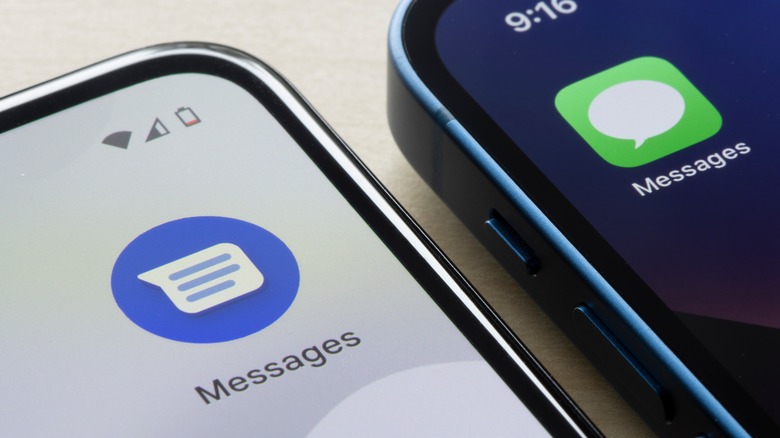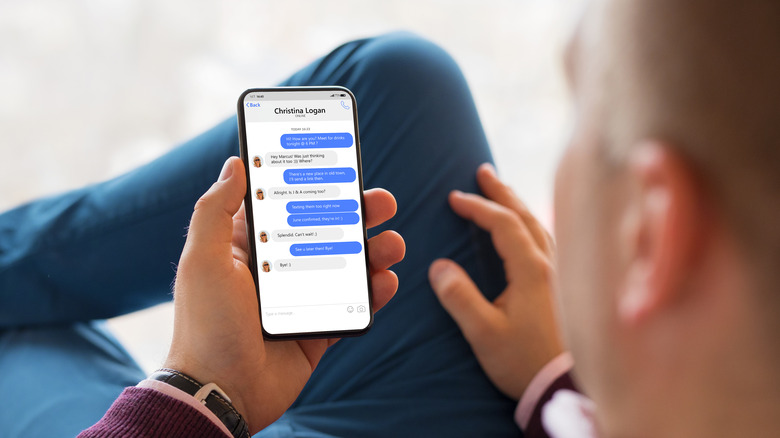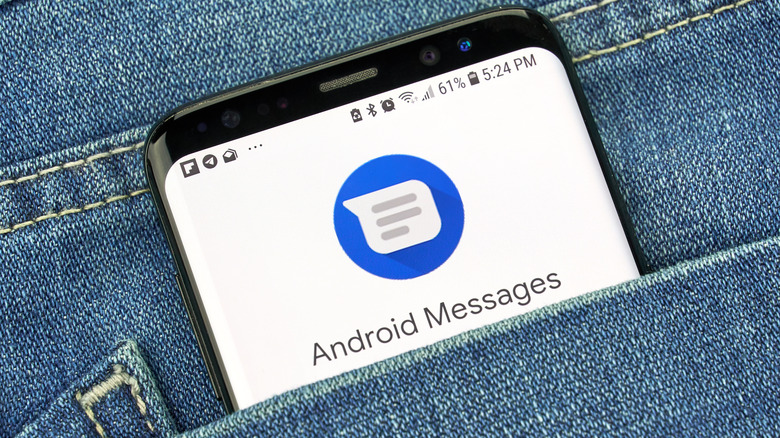Apple Isn't Budging On The RCS Vs. iMessage Debate
The debate over Apple's use of differently-colored message bubbles on iMessage to differentiate texts from Android has been raging for several years. Things came to a head in 2022 when Google decided to publicly call out Apple on the matter. The debate exists because text messages sent to iOS devices from an Android phone show up as green text bubbles, not the blue-colored bubble representing texts from iPhones. Apple's decision to color-code messages has been blamed for creating a rift between iOS and Android users — with some reports even claiming that the youngsters owning an Android smartphone were subjected to bullying and mockery (via WSJ).
Aside from the social issues supposedly caused by the colored bubbles, iMessage was also notoriously bad at interoperability. For example, a message sent from an iPhone to an Android device is converted to a standard SMS format, which does not support advanced features like read receipts, typing indicators, and message reactions. Group chats — which is a fairly common feature on messaging platforms — become an absolute nightmare on iMessage if some of the participants use an Android smartphone.
Things get progressively worse when people attempt to transfer multimedia files between Android and Apple devices. In such cases, iMessage defaults to the archaic MMS format that is now close to two decades old. The result? Smooth 1080p videos are compressed into oblivion and transformed into tiny files barely 100 pixels wide. As outrageous as it might sound, Apple has done absolutely nothing to improve iMessage's interoperability, and it has also long decided against launching an iMessage app for Android — and by the looks of it, no amount of pressure will change that. This was made amply clear when Apple CEO Tim Cook was recently asked a question about the topic.
Buy your mom an iPhone, says Tim Cook
At an event on the sidelines of Apple's recent launch event, Tim Cook was asked what his company thought about Google's call to adopt the RCS (Rich Communication Services) standard for messaging — a move that would go a long way in ending the interoperability issues plaguing iMessage. Cook was also asked about his thoughts on Apple's policy of using colored bubbles to differentiate between Android and iOS users.
In his response, Cook made it amply clear that Apple has no plans to support the RCS format in the foreseeable future (via The Verge). Cook cited a lack of demand for RCS compatibility from a large subset of iMessage users as the primary reason for not "putting a lot of energy" into the initiative. When a journalist complained to Cook about the lack of iMessage's interoperability leading to a poor video sharing experience with the journalist's mom, Cook's suggestion was to simply buy her an iPhone.
Cook's recent reaction to the iMessage versus RCS debate was the first official response from Apple regarding this matter following Google's efforts this year. In a move to put pressure on Apple, Google ended up running an entire campaign to coax it into adopting the supposedly open standard. Google claimed that Apple adopting RCS would end the interoperability issues that currently plague iMessage. Google touted RCS as an industry standard that Apple was refusing to adhere to — and also made attempts to differentiate RCS from existing cross-platform messaging apps like WhatsApp and Telegram — with claims that RCS was not a standalone messaging app like them.
RCS is not immune to issues
Even though Google has been promoting the RCS standard as the best thing since sliced bread, the messaging protocol does come with its share of issues. Worldwide adoption of RCS needs to be enabled on the carrier's side, and not all carriers seem to be on board with Google's plans, either.
In 2019, Google circumvented this problem by enabling RCS support on the Google Messages app, which is now the default text messaging app on most Android smartphones. Another issue that plagued initial versions of RCS was that the platform, until recently, did not support end-to-end encryption. In fact, the RCS standard, to this day, does not offer end-to-end encryption when users engage in group chat using the platform.
Another issue that has negatively affected the adoption rate of RCS is the fact that the feature is not turned on by default on Google's Messages app, meaning it has to be manually turned on by the user within the settings menu. Additionally, by the time Google began to tout the advantages of RCS over standard SMS and MMS, the rest of the world had already moved on to apps like WhatsApp, Telegram, and iMessage.


